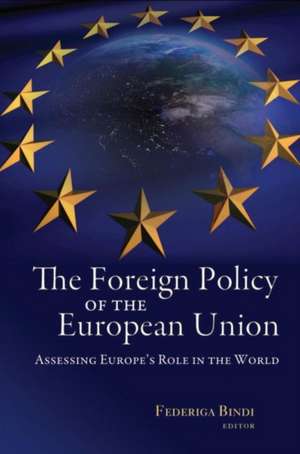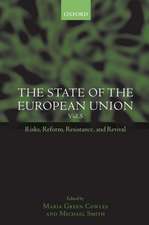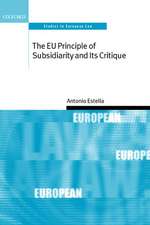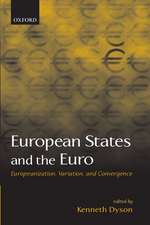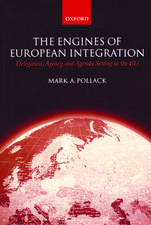The Foreign Policy of the European Union: Assessing Europe's Role in the World
Editat de Federiga Bindien Limba Engleză Paperback – 18 dec 2009
In a relatively short time, the European Union has become one of the world's most powerful and important bodies. Its critical role in international affairs extends to several different areas: economics; culture; the environment; and, of course, international security and foreign affairs. This important volume explains and evaluates EU foreign policy in all its confusing dimensions.
Is there really any such thing as "European Union Foreign Policy"? If so, what is it? What are its goals and priorities, and how effective is it? How do outsiders perceive EU foreign policy, and what are the ramifications of those views? Those are just some of the questions this book tries to answer.
In order to draw the most comprehensive picture possible of EU foreign policy, Federiga Bindi and her contributors dissect both "horizontal" and "vertical" issues. Vertical concerns focus on particular geographic regions, such as the EU's foreign policy toward Africa and Asia and its relations with the United States. Horizontal issues explore wider crosscutting themes that help explain the EU's foreign policy choices and operations, such as decisionmaking processes and procedures; European self-identity; and core priorities such as peace, democracy, and human rights.
Contents
Foreword by Giuliano Amato, former foreign minister and prime minister of Italy
Part I. The New Tools of EU Foreign Policy
II. US-EU Relations after the Elections
III. EU Relations with the Rest of the Americas
IV. Africa and Asia
V. The EU and Its Neighbors
VI. The EU, the Mediterranean, and the Middle East
VII. Promoting Values and Models Abroad
VIII. Conclusions: Assessing EU Foreign Policy
Is there really any such thing as "European Union Foreign Policy"? If so, what is it? What are its goals and priorities, and how effective is it? How do outsiders perceive EU foreign policy, and what are the ramifications of those views? Those are just some of the questions this book tries to answer.
In order to draw the most comprehensive picture possible of EU foreign policy, Federiga Bindi and her contributors dissect both "horizontal" and "vertical" issues. Vertical concerns focus on particular geographic regions, such as the EU's foreign policy toward Africa and Asia and its relations with the United States. Horizontal issues explore wider crosscutting themes that help explain the EU's foreign policy choices and operations, such as decisionmaking processes and procedures; European self-identity; and core priorities such as peace, democracy, and human rights.
Contents
Foreword by Giuliano Amato, former foreign minister and prime minister of Italy
Part I. The New Tools of EU Foreign Policy
II. US-EU Relations after the Elections
III. EU Relations with the Rest of the Americas
IV. Africa and Asia
V. The EU and Its Neighbors
VI. The EU, the Mediterranean, and the Middle East
VII. Promoting Values and Models Abroad
VIII. Conclusions: Assessing EU Foreign Policy
Preț: 287.79 lei
Nou
Puncte Express: 432
Preț estimativ în valută:
55.07€ • 57.17$ • 45.92£
55.07€ • 57.17$ • 45.92£
Carte tipărită la comandă
Livrare economică 25 martie-08 aprilie
Preluare comenzi: 021 569.72.76
Specificații
ISBN-13: 9780815701408
ISBN-10: 0815701403
Pagini: 367
Dimensiuni: 152 x 229 x 28 mm
Greutate: 0.52 kg
Editura: Brookings Institution Press
Colecția Brookings Institution Press
ISBN-10: 0815701403
Pagini: 367
Dimensiuni: 152 x 229 x 28 mm
Greutate: 0.52 kg
Editura: Brookings Institution Press
Colecția Brookings Institution Press
Notă biografică
Federiga Bindi holds the Jean Monnet Chair in European Political Integration at the University of Rome Tor Vergata, where she also directs the European Office. She is currently a visiting fellow with the Brookings Institution's Center for the United States and Europe and is the author of Italy and the EU (Palgrave Macmillan, 2007).
Descriere
In a relatively short time, the European Union has become one of the world's most powerful and important bodies. Its critical role in international affairs extends to several different areas: economics; culture; the environment; and, of course, international security and foreign affairs. This important volume explains and evaluates EU foreign policy in all its confusing dimensions.
Is there really any such thing as "European Union Foreign Policy"? If so, what is it? What are its goals and priorities, and how effective is it? How do outsiders perceive EU foreign policy, and what are the ramifications of those views? Those are just some of the questions this book tries to answer.
In order to draw the most comprehensive picture possible of EU foreign policy, Federiga Bindi and her contributors dissect both "horizontal" and "vertical" issues. Vertical concerns focus on particular geographic regions, such as the EU's foreign policy toward Africa and Asia and its relations with the United States. Horizontal issues explore wider crosscutting themes that help explain the EU's foreign policy choices and operations, such as decisionmaking processes and procedures; European self-identity; and core priorities such as peace, democracy, and human rights.
Contents
Foreword by Giuliano Amato, former foreign minister and prime minister of Italy
Part I. The New Tools of EU Foreign Policy
II. US-EU Relations after the Elections
III. EU Relations with the Rest of the Americas
IV. Africa and Asia
V. The EU and Its Neighbors
VI. The EU, the Mediterranean, and the Middle East
VII. Promoting Values and Models Abroad
VIII. Conclusions: Assessing EU Foreign Policy
Is there really any such thing as "European Union Foreign Policy"? If so, what is it? What are its goals and priorities, and how effective is it? How do outsiders perceive EU foreign policy, and what are the ramifications of those views? Those are just some of the questions this book tries to answer.
In order to draw the most comprehensive picture possible of EU foreign policy, Federiga Bindi and her contributors dissect both "horizontal" and "vertical" issues. Vertical concerns focus on particular geographic regions, such as the EU's foreign policy toward Africa and Asia and its relations with the United States. Horizontal issues explore wider crosscutting themes that help explain the EU's foreign policy choices and operations, such as decisionmaking processes and procedures; European self-identity; and core priorities such as peace, democracy, and human rights.
Contents
Foreword by Giuliano Amato, former foreign minister and prime minister of Italy
Part I. The New Tools of EU Foreign Policy
II. US-EU Relations after the Elections
III. EU Relations with the Rest of the Americas
IV. Africa and Asia
V. The EU and Its Neighbors
VI. The EU, the Mediterranean, and the Middle East
VII. Promoting Values and Models Abroad
VIII. Conclusions: Assessing EU Foreign Policy
